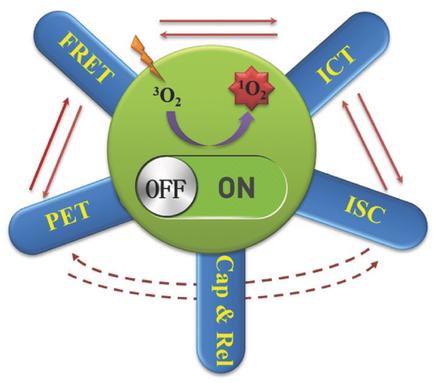Our official English website, www.x-mol.net, welcomes your
feedback! (Note: you will need to create a separate account there.)
Controllable Photodynamic Therapy Implemented by Regulating Singlet Oxygen Efficiency
Advanced Science ( IF 14.3 ) Pub Date : 2017-06-23 01:56:32 , DOI: 10.1002/advs.201700113 Wenting Wu 1, 2 , Xiaodong Shao 1 , Jianzhang Zhao 2 , Mingbo Wu 1
Advanced Science ( IF 14.3 ) Pub Date : 2017-06-23 01:56:32 , DOI: 10.1002/advs.201700113 Wenting Wu 1, 2 , Xiaodong Shao 1 , Jianzhang Zhao 2 , Mingbo Wu 1
Affiliation

|
With singlet oxygen (1O2) as the active agent, photodynamic therapy (PDT) is a promising technique for the treatment of various tumors and cancers. But it is hampered by the poor selectivity of most traditional photosensitizers (PS). In this review, we present a summary of controllable PDT implemented by regulating singlet oxygen efficiency. Herein, various controllable PDT strategies based on different initiating conditions (such as pH, light, H2O2 and so on) have been summarized and introduced. More importantly, the action mechanisms of controllable PDT strategies, such as photoinduced electron transfer (PET), fluorescence resonance energy transfer (FRET), intramolecular charge transfer (ICT) and some physical/chemical means (e.g. captivity and release), are described as a key point in the article. This review provide a general overview of designing novel PS or strategies for effective and controllable PDT.
中文翻译:

通过调节单线态氧效率实现可控的光动力疗法
以单线态氧(1 O 2)为活性剂,光动力疗法(PDT)是一种用于治疗各种肿瘤和癌症的有前途的技术。但是,大多数传统的光敏剂(PS)的选择性差,使它受阻。在这篇综述中,我们总结了通过调节单线态氧效率实现的可控PDT。本文中,基于不同的启动条件(例如pH值,光照,H 2 O 2)的各种可控PDT策略等)进行了总结和介绍。更重要的是,可控PDT策略的作用机理如光诱导电子转移(PET),荧光共振能量转移(FRET),分子内电荷转移(ICT)和某些物理/化学手段(例如,俘获和释放)被描述为:文章中的关键点。这篇综述提供了设计新颖的PS或有效且可控PDT的策略的总体概述。
更新日期:2017-06-24
中文翻译:

通过调节单线态氧效率实现可控的光动力疗法
以单线态氧(1 O 2)为活性剂,光动力疗法(PDT)是一种用于治疗各种肿瘤和癌症的有前途的技术。但是,大多数传统的光敏剂(PS)的选择性差,使它受阻。在这篇综述中,我们总结了通过调节单线态氧效率实现的可控PDT。本文中,基于不同的启动条件(例如pH值,光照,H 2 O 2)的各种可控PDT策略等)进行了总结和介绍。更重要的是,可控PDT策略的作用机理如光诱导电子转移(PET),荧光共振能量转移(FRET),分子内电荷转移(ICT)和某些物理/化学手段(例如,俘获和释放)被描述为:文章中的关键点。这篇综述提供了设计新颖的PS或有效且可控PDT的策略的总体概述。











































 京公网安备 11010802027423号
京公网安备 11010802027423号